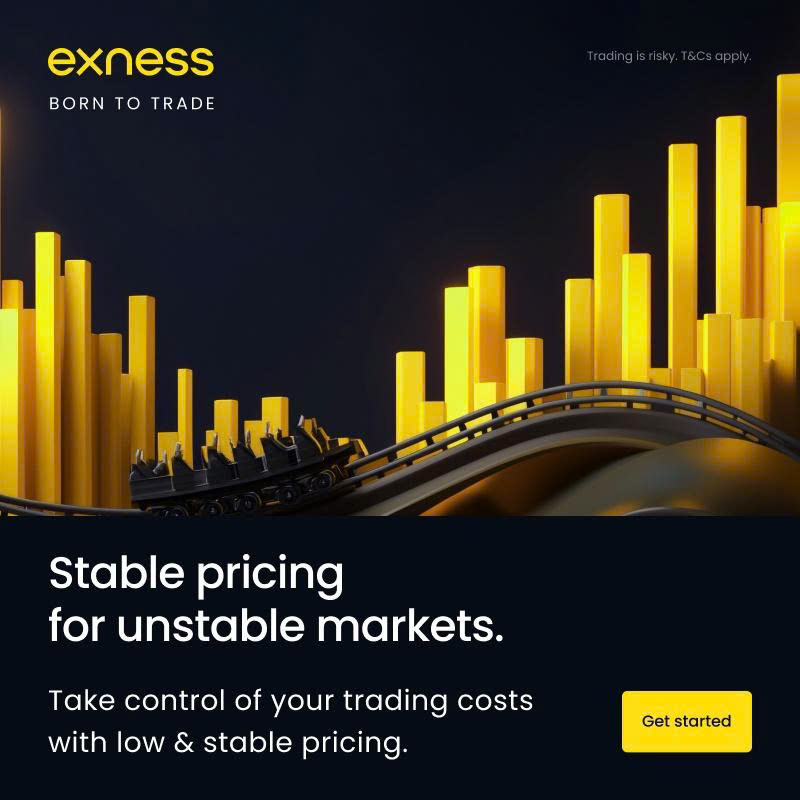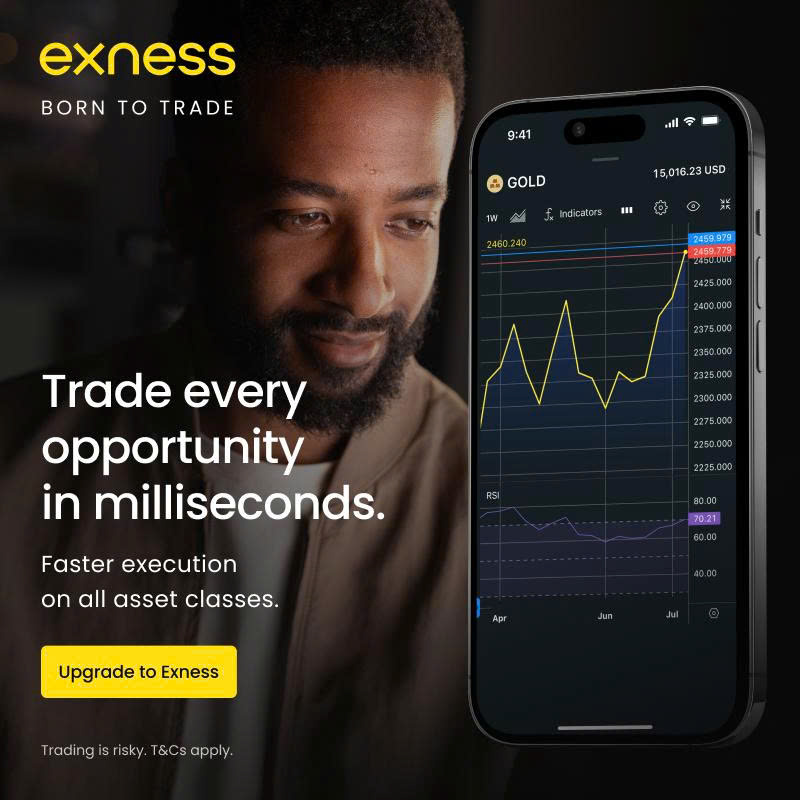
8 minute read
Is Exness Banned in Malaysia? The Truth for Traders in 2025
from Exness
by Exness Blog
If you’re a Malaysian trader wondering, “Is Exness banned in Malaysia?” let’s cut to the chase: Exness is not explicitly banned in Malaysia, but it’s not regulated by local authorities either. This means Malaysian traders can still use Exness through its international platforms, but there are some risks and nuances you need to understand. In this article, I’ll break down Exness’s legal status in Malaysia, why it’s a gray area, and what you should consider before trading with them. Whether you’re a beginner or a seasoned trader, this guide will help you navigate the situation with confidence.

✅ Trade with Exness now: Open An Account or Visit Brokers 👈
What’s the Deal with Exness in Malaysia?
Exness is a global forex and CFD broker that’s been around since 2008, known for its low spreads, high leverage (up to 1:2000), and user-friendly platforms like MetaTrader 4 and 5. It’s a big name in the trading world, with millions of clients and a monthly trading volume exceeding $4.5 trillion as of 2023. But when it comes to Malaysia, things get a bit murky.
Here’s the situation: Exness is not licensed by the Securities Commission Malaysia (SC) or Bank Negara Malaysia (BNM), the two main bodies regulating financial markets in the country. This lack of local regulation has led to restrictions, with Exness choosing not to accept new clients from Malaysia since November 2017. However, existing clients can still trade, and some traders access Exness through international platforms. So, while it’s not an outright ban, the broker operates in a regulatory gray area for Malaysians.
Why Isn’t Exness Regulated in Malaysia?
To understand why Exness isn’t fully operational in Malaysia, let’s look at the country’s regulatory landscape. Malaysia has a robust framework for forex trading, overseen by:
Securities Commission Malaysia (SC): Regulates financial markets, including forex brokers, to ensure transparency and investor protection.
Bank Negara Malaysia (BNM): Oversees currency exchange and broader financial regulations to maintain economic stability.
Forex trading is legal in Malaysia, but brokers must either hold a local license from the SC or comply with international standards if they’re offshore. Exness holds licenses from reputable global regulators like the Financial Conduct Authority (FCA) in the UK, Cyprus Securities and Exchange Commission (CySEC), and Financial Sector Conduct Authority (FSCA) in South Africa. These licenses ensure Exness follows strict standards for client fund segregation, transparency, and anti-money laundering (AML) compliance.
However, Exness has not pursued a local license from the SC, likely due to the complex and stringent requirements. Instead, it made a commercial decision to stop onboarding new Malaysian clients. This isn’t because of any fraud or misconduct but rather a strategic choice to avoid navigating Malaysia’s regulatory hurdles.
So, Can Malaysians Still Trade with Exness?
Yes, but with caveats. Malaysian traders can access Exness through its international entities (regulated by CySEC, FCA, or FSA). You can register using offshore platforms, often through methods like:
Using international domains that aren’t geo-blocked.
Funding accounts via e-wallets or cryptocurrencies to bypass banking restrictions.
Occasionally, using VPNs (though this is risky and not recommended).
Here’s the catch: Trading with an offshore broker like Exness means you’re not protected by Malaysian law. If something goes wrong—say, a dispute over funds—you can’t rely on local authorities like the SC to step in. Your protection comes from Exness’s international regulators, which are solid but don’t carry the same weight in Malaysia.
Why Do Some People Think Exness Is Banned?
The confusion about Exness being “banned” stems from a few factors:
Regulatory Restrictions: In 2023, some sources reported that Exness faced a ban due to non-compliance with Malaysian regulations, particularly for operating without an SC license. However, this was more about Exness failing to meet local licensing requirements than an outright prohibition.
Restricted Access for New Clients: Since 2017, Exness has stopped accepting new Malaysian residents as clients, which feels like a ban to some traders.
General Crackdowns: Malaysia has cracked down on unregulated brokers to protect investors, leading to assumptions that platforms like Exness are fully banned.
In reality, Exness isn’t banned outright—it’s just not locally regulated, and its decision to limit new accounts has created a perception of restriction.

✅ Trade with Exness now: Open An Account or Visit Brokers 👈
What Are the Risks of Trading with Exness in Malaysia?
While Exness is a trusted broker globally, trading with them as a Malaysian comes with risks:
Lack of Local Protection: Without SC regulation, you’re not covered by Malaysia’s investor protection laws. If Exness were to face insolvency or a dispute arises, resolving it could be tricky.
Legal Gray Area: Using offshore platforms or methods like VPNs to access Exness could violate Malaysian regulations, though enforcement is rare for individual traders.
Banking Challenges: Some Malaysian banks may flag transactions to offshore brokers, leading to delays or rejections. Using e-wallets or crypto can help, but these methods carry their own risks.
On the flip side, Exness has strong safety features:
Segregated Funds: Client funds are kept separate from company funds, reducing the risk of loss.
Global Regulation: Licenses from FCA, CySEC, and others ensure high standards.
Audits: Exness is regularly audited by firms like Deloitte for transparency.
How to Trade Safely with Exness in Malaysia
If you’re set on trading with Exness, here’s how to do it as safely as possible:
Verify Your Account: Complete Exness’s Know Your Customer (KYC) process with valid ID and proof of address. This ensures compliance with international regulations.
Use Secure Payment Methods: Opt for e-wallets like Skrill or Neteller, or crypto, to avoid banking issues. Exness also supports FPX, a local payment gateway, for easier deposits.
Understand the Risks: Be aware that you’re trading without local regulatory protection. Only invest what you can afford to lose.
Stay Informed: Keep an eye on Malaysia’s forex regulations, as they can change. Check Exness’s official Help Center for updates on restricted countries.
Consult a Professional: If you’re unsure about the legal or tax implications, talk to a financial advisor or tax professional.
Alternatives to Exness for Malaysian Traders
If Exness’s lack of local regulation makes you uneasy, plenty of regulated brokers operate in Malaysia. Here are a few options:
Pepperstone: Licensed by ASIC (Australia) and FCA (UK), Pepperstone offers tight spreads and a strong reputation. It’s a popular choice for Malaysian traders.
XM: Regulated by CySEC and ASIC, XM is known for its low minimum deposits and beginner-friendly platform.
HFM (HotForex): Also regulated by multiple authorities, HFM offers a range of account types and competitive trading conditions.
These brokers are more likely to comply with Malaysian regulations or have clearer legal standing, giving you extra peace of mind.
Should You Trade with Exness in Malaysia?
Exness is a reputable broker with a strong global track record, but its lack of SC regulation means it’s not the safest choice for Malaysian traders. If you’re an existing client or comfortable navigating the risks of offshore trading, Exness offers excellent features like low spreads, fast withdrawals, and a user-friendly platform. But if local protection is a priority, you might be better off with a regulated alternative like Pepperstone or XM.
Here’s my take: Exness isn’t banned, but it’s not fully legal in Malaysia either. You can trade with them, but you’re doing so in a gray area. Weigh the risks, do your research, and consider your priorities—security, convenience, or trading conditions—before deciding.
FAQs About Exness in Malaysia
1. Is Exness completely banned in Malaysia?No, Exness is not banned, but it’s not regulated by the Securities Commission Malaysia (SC). It stopped accepting new Malaysian clients in 2017, but existing clients can still trade.
2. Can I use a VPN to access Exness?While technically possible, using a VPN to bypass restrictions violates Exness’s terms and could lead to account suspension. It’s not worth the risk.
3. Are my funds safe with Exness?Exness is regulated by global authorities like FCA and CySEC, with segregated client funds and regular audits. However, without SC regulation, you lack local legal recourse in disputes.
4. What payment methods can Malaysians use with Exness?Exness supports local options like FPX, as well as e-wallets (Skrill, Neteller) and cryptocurrencies. Bank transfers may face scrutiny from local banks.
5. Are there regulated alternatives to Exness in Malaysia?Yes, brokers like Pepperstone, XM, and HFM are regulated by international authorities and are popular among Malaysian traders.
Final Thoughts
Trading with Exness in Malaysia is possible, but it comes with risks due to the lack of local regulation. If you’re drawn to Exness’s competitive spreads and high leverage, make sure you understand the legal and financial implications. For a safer bet, consider brokers regulated by the SC or other reputable authorities. Whatever you choose, stay informed and trade smart—your money deserves it.
✅ Trade with Exness now: Open An Account or Visit Brokers 👈
Read more:










